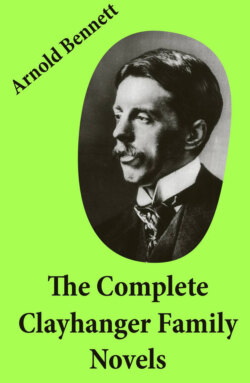Читать книгу The Complete Clayhanger Family Novels (Clayhanger + Hilda Lessways + These Twain + The Roll Call) - Arnold Bennett - Страница 16
На сайте Литреса книга снята с продажи.
Three.
ОглавлениеIn the wedge-shaped doorway between the windows stood two men, one middle-aged and one old, one bareheaded and the other with a beaver hat, engaged in conversation. They were talking easily, pleasantly, with free gestures, the younger looking down in deferential smiles at the elder, and the elder looking up benignantly at the younger. You could see that, having begun with a business matter, they had quitted it for a topic of the hour. But business none the less went forward, the shop functioned, the presses behind the shop were being driven by steam as advertised; a customer emerged, and was curtly nodded at by the proprietor as he squeezed past; a girl with a small flannel apron over a large cotton apron went timidly into the shop. The trickling, calm commerce of a provincial town was proceeding, bit being added to bit and item to item, until at the week’s end a series of apparent nothings had swollen into the livelihood of near half a score of people. And nobody perceived how interesting it was, this interchange of activities, this ebb and flow of money, this sluggish rise and fall of reputations and fortunes, stretching out of one century into another and towards a third! Printing had been done at that corner, though not by steam, since the time of the French Revolution. Bibles and illustrated herbals had been laboriously produced by hand at that corner, and hawked on the backs of asses all over the county; and nobody heard romance in the puffing of the hidden steam-engine multiplying catalogues and billheads on the self-same spot at the rate of hundreds an hour.
The younger and bigger of the two men chatting in the doorway was Darius Clayhanger, Edwin’s father, and the first printer to introduce steam into Bursley. His age was then under forty-five, but he looked more. He was dressed in black, with an ample shirt-front and a narrow black cravat tied in an angular bow; the wristbands were almost tight on the wrists, and, owing to the shortness of the alpaca coat-sleeves, they were very visible even as Darius Clayhanger stood, with his two hands deep in the horizontal pockets of his ‘full-fall’ trousers. They were not precisely dirty, these wristbands, nor was the shirt-front, nor the turned-down pointed collar, but all the linen looked as though it would scarcely be wearable the next day. Clayhanger’s linen invariably looked like that, not dirty and not clean; and further, he appeared to wear eternally the same suit, ever on the point of being done for and never being done for. The trousers always had marked transverse creases; the waistcoat always showed shiningly the outline of every article in the pockets thereof, and it always had a few stains down the front (and never more than a few), and the lowest button insecure. The coat, faintly discoloured round the collar and fretted at the cuffs, fitted him easily and loosely like the character of an old crony; it was as if it had grown up with him, and had expanded with his girth. His head was a little bald on the top, but there was still a great deal of mixed brown and greyish hair at the back and the sides, and the moustache, hanging straight down with an effect recalling the mouth of a seal, was plenteous and defiant—a moustache of character, contradicting the full placidity of the badly shaved chin. Darius Clayhanger had a habit, when reflective or fierce, of biting with his upper teeth as far down as he could on the lower lip; this trick added emphasis to the moustache. He stood, his feet in their clumsy boots planted firmly about sixteen inches apart, his elbows sticking out, and his head bent sideways, listening to and answering his companion with mien now eager, now roguish, now distinctly respectful.
The older man, Mr Shushions, was apparently very old. He was one of those men of whom one says in conclusion that they are very old. He seemed to be so fully occupied all the time in conducting those physical operations which we perform without thinking of them, that each in his case became a feat. He balanced himself on his legs with conscious craft; he directed carefully his shaking and gnarled hand to his beard in order to stroke it. When he collected his thoughts into a sentence and uttered it in his weak, quavering voice, he did something wonderful; he listened closely, as though to an imperfectly acquired foreign language; and when he was not otherwise employed, he gave attention to the serious business of breathing. He wore a black silk stock, in a style even more antique than his remarkable headgear, and his trousers were very tight. He had survived into another and a more fortunate age than his own.
